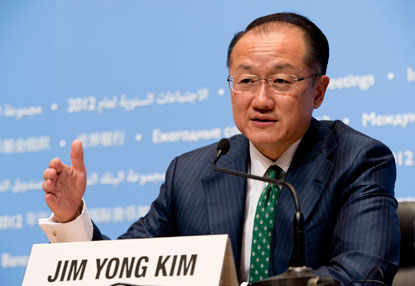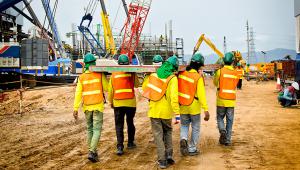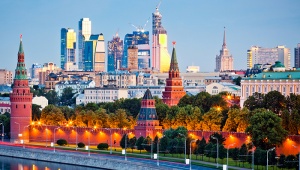Jim-Yong-Kim---FLICKR.jpg

World Bank president Jim Yong Kim urged governments to seize the opportunity provided by this modest growth uptick to make much-needed investments in infrastructure and human capital.
The bank forecasts the global economy could expand by 2.7% this year, up from 2016’s pre-crisis low of 2.3%, thanks to rising oil prices and the prospect of significant fiscal stimulus in the US under incoming president Donald Trump.
But with a “worrisome” slowdown in investment in emerging and developing economies threatening to derail this recovery, World Bank president Jim Yong Kim urged countries to “take advantage of this momentum and increase investments in infrastructure and people”.
“This is vital to accelerating the sustainable and inclusive growth required to end extreme poverty,” he said.
Investment growth in emerging and developing economies has taken a sharp downturn since 2010, falling to 3.4% last year from an average of 10%.
The report said this trend was originally concentrated in the largest and commodity-exporting economies, but has now spread to the majority of emerging and developing markets.
Altogether, these economies account for more than one-third of global GDP and around three-quarters of the world’s population and poor.
While the slowdown reflects a correction from high pre-crisis growth rates in investment, it is also a result of low oil prices, slowing foreign direct investment in commodity importers, debt burdens and political risk, the bank said.
It represents a significant challenge for these economies as they look to manage rapid urbanisation, economic development and achievement of the sustainable development goals.
Paul Romer, World Bank chief economist, said governments should look to build private sector confidence that the new capital it brings can plug “into the infrastructure of global connectivity”.
“Without new streets, the private sector has no incentive to invest in the physical capital of new buildings,” he stated. “Without new work space connected to new living space, the billions of people who want to join the modern economy will lose the chance to invest in the human capital that comes from learning on the job.”
Nevertheless, emerging market and developing commodity exporters can expect a significant uptick in 2017 (to 2.3% growth, up from 0.3% last year), according to the bank, as commodity prices recover from a two-year slump and major emerging markets – Brazil and Russia – continue to grow after deep recessions.
The bank expects unchanged growth, at 5.6%, for their commodity-importing counterparts. It said growth prospects in advanced economies should recover in the next few years, but added that uncertainty generated by political upheaval, particularly in the US, UK and Europe, means “the range of possible outcomes has significantly widened”.
In the US, the inauguration of incoming president Trump, and his pledge to increase government spending, heralds a potential growth boost to 2.2% growth after a weak 2016.
This could also have “ripple effects” around the world because of the “outsize role the US plays in the world economy”, explained Ayhan Kose, World Bank development economic prospects director.
“More expansionary US fiscal policies could lead to stronger growth in the US and abroad over the near-term, but changes to trade or other policies could offset those gains,” he said.
Trump has been vocal about his hostility to China and desire to hit the country with punitive tariffs once he takes office. He has also vowed to tear up free trade agreements like NAFTA, between the US, Canada and Mexico. But the feasibility of this or to what extent the unpredictable president elect will actually act on these statements remains to be seen.
Kose said this uncertainty in itself can be damaging, with potentially “adverse impacts on global growth”.
Uncertainty also reigns in the UK and to a lesser extent the euro area following the former’s vote to quit the European Union last year. Euro area growth is predicted to slow marginally in 2017, to 1.5%, as a result of this, alongside concerns around banking sector stability in nations like Italy, stubbornly low inflation and neutral fiscal policy across the bloc.
Elsewhere, the bank predicts: growth in East Asia and the Pacific will ease to 6.2% this year, as a region-wide pick up is moderated by slowing growth in China; South Asian growth will pick up to 7.1%; Europe and Central Asia will see increased growth of 2.4%; positive growth of 1.2% will return to Latin America and the Caribbean; the Middle East and North Africa will also recover modestly, with a 3.1% expansion; and sub-Saharan Africa will continue to adjust to the impact of lower commodity prices, with a modest growth increase of 2.9%.













